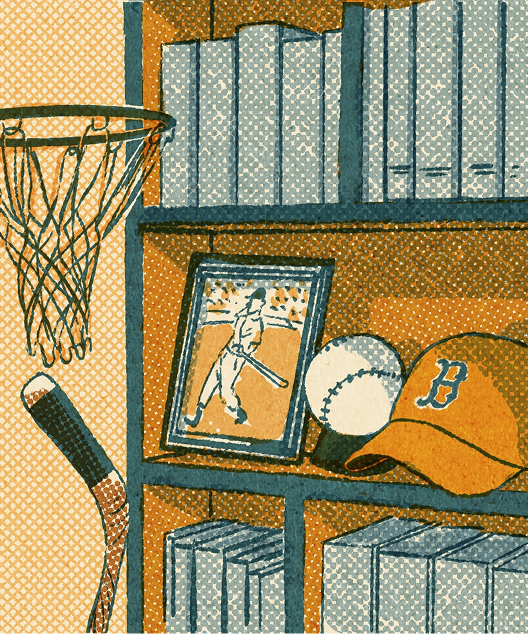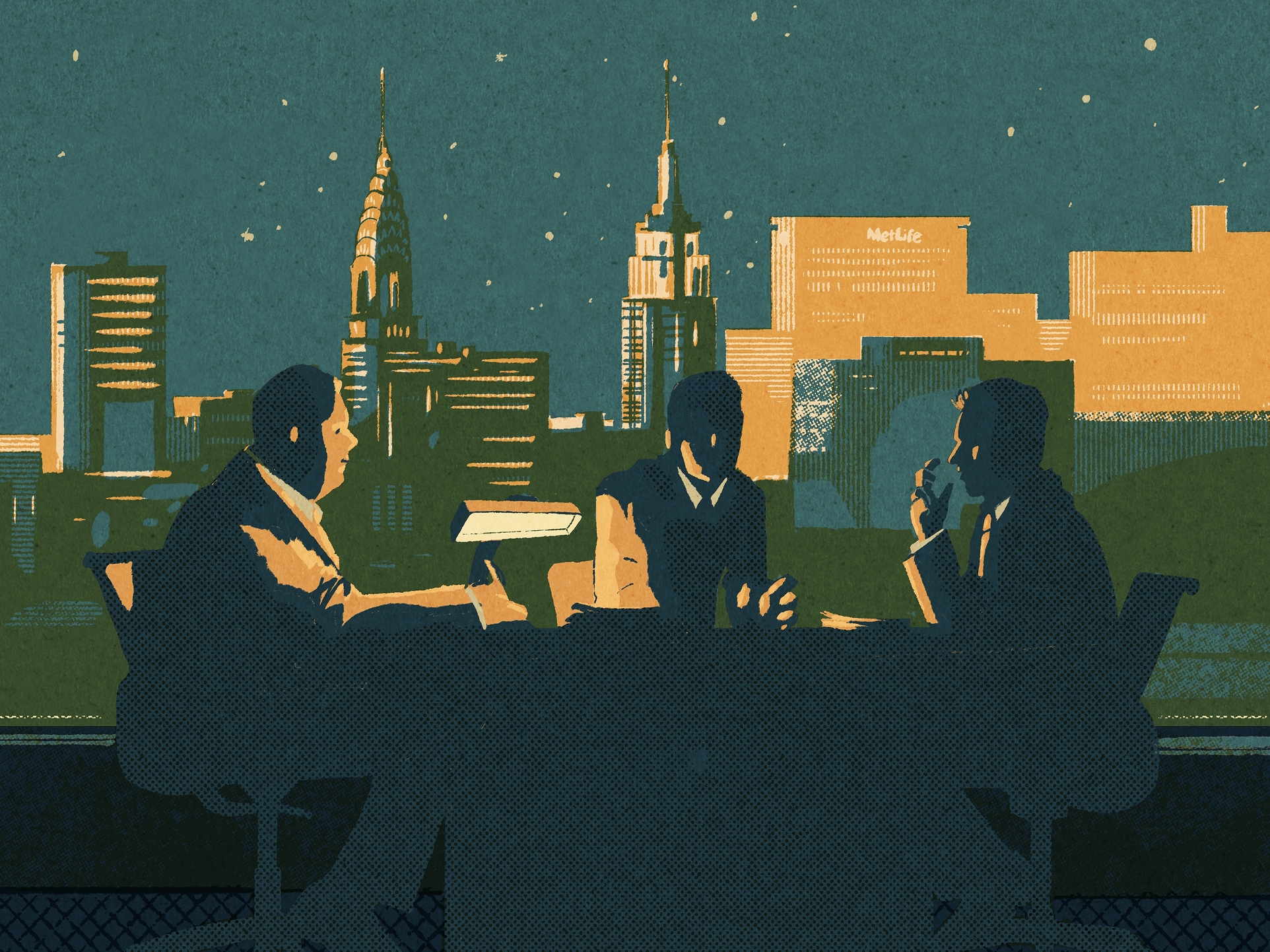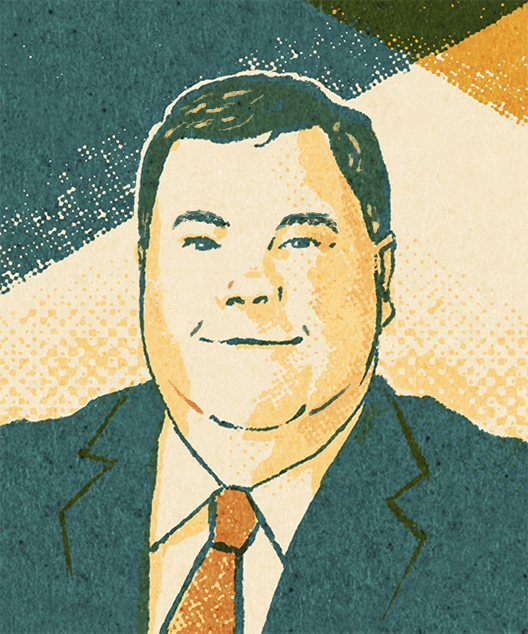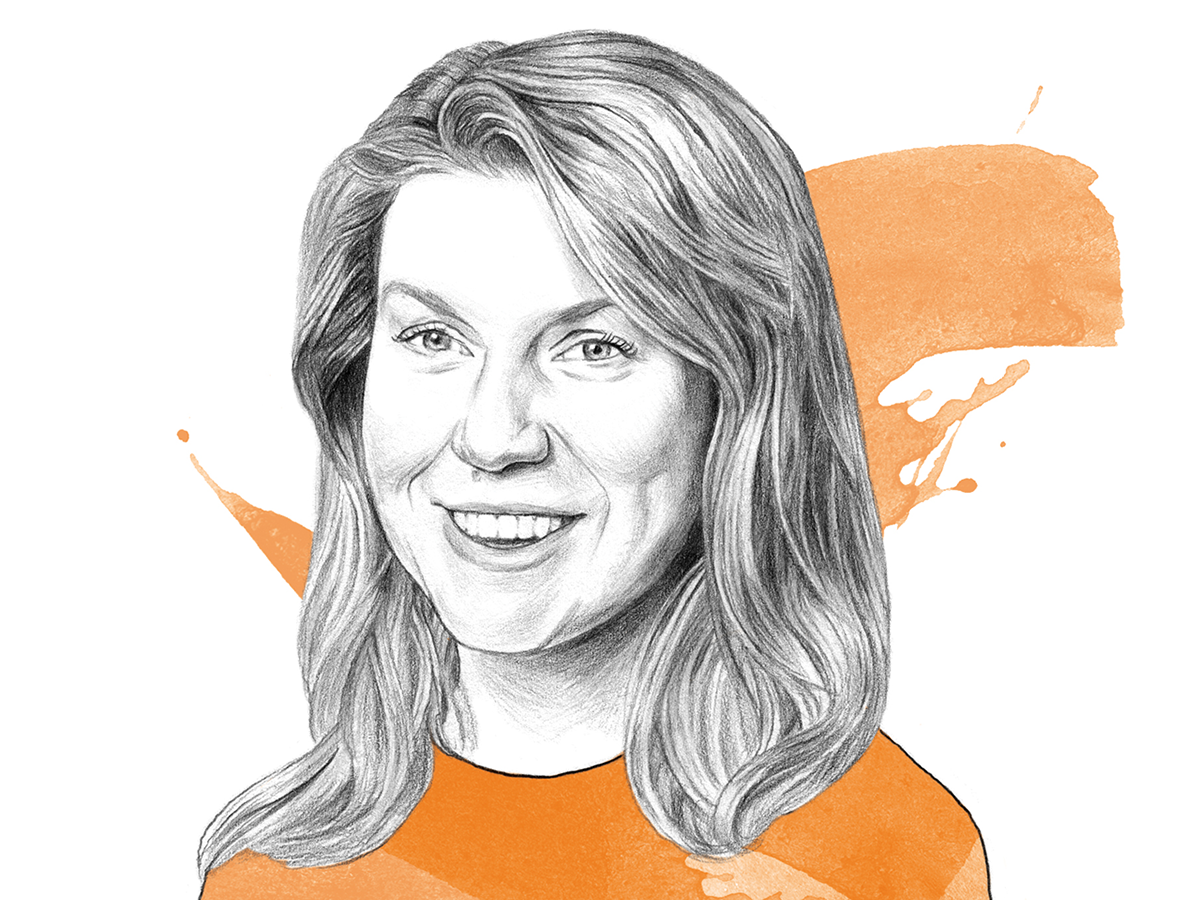Cravath Publishes Winter 2026 Issue of Alumni Journal
In Depth
Ed Weiss Follows Career Ambitions All the Way Home… to Fenway Park

Throughout his career, Ed Weiss has pursued a winding path of opportunity—from clerking in Philadelphia to starting as a young Cravath associate in New York to joining Time Warner (initially, Cable in Stamford, Connecticut, and later, Inc. in Manhattan)—before a homecoming of sorts with Fenway Sports Group in Boston, where he is now Executive Vice President, Corporate Strategy and General Counsel. Along the way, Ed was guided and influenced by mentors and friends who encouraged him to explore new roles even when the way forward seemed uncertain or less comfortable.
Born and raised just outside of Boston, Ed Weiss had what he calls a “typical” upbringing. He attended a Catholic boys school and built friendships that he still considers among the best—and most central—of his life. “If I were stranded in the middle of the night somewhere with a flat tire today, I could still call any of them and they would come,” he says. “Building and maintaining those lifelong relationships is a very important part of who I am.”
Those friendships often intertwined with sports, which were and continue to be part of the fabric of the city and Ed’s life. Decades before he ever started at Fenway Sports Group, he fondly recalls playing hockey and baseball as a child, and rooting—passionately, as New Englanders do—for the Bruins, Red Sox and Celtics (even the Patriots, “then a historically inept franchise,” in his words).
Bostonians have a “very provincial outlook on the world,” he explains, sitting in his office in Fenway Park, which is decorated with baseball memorabilia and scattered with personal effects. “The view is that no one leaves by choice. You have to understand that most of my family would ask me during my time at Cravath, ‘I know you’re working at some firm in New York and I hope that’s good, but could you ever get a job back home here in Boston?’”
As Ed describes it, he didn’t have any “master plan” when he decided to go to law school; he just felt it seemed the best available option at the time. He had received an undergraduate degree in history and economics from Harvard College in 1988, and soon after departed Cambridge for Philadelphia, where he received a J.D. from the University of Pennsylvania Carey Law School in 1991.

“My law school experience was probably a little different than most, in that I played for the Penn club hockey team, which was primarily undergrads,” he says. “We went on road trips to places like Iowa and Chicago. So I think to my other fellow 1L students, who wouldn’t see me for a week or two at a time, I was a little bit of a renegade, but I haven’t regretted it for a minute since.”
After graduating from Penn Law, Ed stayed in Philadelphia, clerking for the Honorable Jay C. Waldman of the U.S. District Court for the Eastern District of Pennsylvania. Judge Waldman had been a prosecutor, and as Ed recalls: “We tried lots and lots of cases in those days and we would break down the entire day’s events for hours on end when we got back into chambers. The clerkship really gave me a skillset that helped when I ultimately made the decision to move to New York to join Cravath.”
Ed vividly remembers starting as a first-year associate at Cravath (where he had also spent his 2L summer) on the same October day the 1992 Cable Act passed. He and a fellow associate spent the night writing a memo for Bob Joffe and Stu Gold, both litigation partners at the time, about challenging the constitutionality of many elements of the Act and seeking an immediate injunction.
“I remember the spring of my first year at Cravath. A special tribunal comprised of two U.S. district court judges and a D.C. appellate judge—a unique, three-judge court provision rare for a statute at the time—ruled 2-1 against us, and we had a direct (mandatory) appeal right to the U.S. Supreme Court,” Ed says. “Because the other associate was a two-time Supreme Court clerk, he couldn’t work on the appeal. And that’s how I found myself writing the emergency injunction papers to Chief Justice Rehnquist, in his capacity as circuit justice. The case ultimately went before the entire Supreme Court twice.”
Ed notes of the experience, “I do really value that Bob and Stu had this great confidence in me to let me do something like that so early in my career.” That confidence in his work, even when the road was daunting, and the professional relationships Ed cultivated early on—and continued to rely on—were among the things he considered pillars of his Cravath experience.
“There wasn’t really a plan to leave,” Ed says. “I felt right from the beginning that I wanted to stay and become a partner, but life had other plans for me.”

As an associate, Ed remembers doing an incredible amount of work for Time Warner Cable, and the person with whom he worked most was a Cravath alumnus named Marc Lawrence-Apfelbaum, who was later promoted to general counsel of the company. “Marc literally called me up one day and said, ‘How would you like my old job running all the litigation and antitrust stuff at Time Warner Cable?’” Ed recalls.
Ed’s initial reaction was, “I’m not interested,” he says. But when he hung up the phone, he realized he didn’t know how many more times an opportunity like that would present itself in his career, and so he reconsidered.
“I was four years in at Cravath and engaged to my wife, Susan, at the time. We were trying to figure out where we were going to live and how we would build our lives together,” Ed remembers. “So, I decided to have lunch with Marc, and that’s how it came to be that I left the Firm even though I was not looking to.”
Ed and Susan—who met in Philadelphia while he was at Penn Law—ended up moving to Connecticut, convenient both for his Time Warner Cable role in Stamford and her job in Westport. But it wasn’t long after the two settled down and started a family that a similar situation arose for Ed, again spurred by the connections he’d made at Cravath.
As Ed tells it, a few years after taking the Time Warner Cable job, a good friend from the Firm (and close friend to this day) named Chris Bogart was positioned as the general counsel-to-be at Time Warner Inc., “and he asked me to come back to New York and run all the litigation and antitrust for the whole company—not just for the cable division.”
Ed’s first reaction was, again, to decline: “I was very happy where I was and had just moved my whole life out to Connecticut.” But then he thought about how an opportunity like that really might not come around another time. “That’s how I went to become the head of litigation at Time Warner Inc.,” Ed says. “Probably at an age where I really wasn’t ready to have that job.”
At the time, Ed thought that between him and Chris, they probably had more responsibility than almost any other lawyers their age in corporate America. “But we had been prepared for that type of accountability because of our time at Cravath,” he explains. “Chris and I both had the confidence that we were able to handle these new roles because of the training we received, the responsibilities we’d been given, and especially the mentors we’d had.”
Ed adds: “A lot of what Cravath had taught us was, you can be put in situations where you may be given more than you’re necessarily prepared for, and it’s often about leaning on the skills that you’ve collected and the poise that you’ve developed where you can navigate the situation, make it work and do a good job. That, and in really digging deep and doing the work.”
“[We] both had the confidence that we were able to handle these new roles because of the training we received, the responsibilities we’d been given, and especially the mentors we’d had.”
– Ed Weiss
Back then, Time Warner was the parent company to Warner Brothers, HBO, CNN, Time Inc. and New Line Cinema, among other well-known media and entertainment brands. Ed joined as senior vice president and deputy general counsel, and was with the company when it merged with AOL in 2000. For several years, he was occupied with a lot of post-merger work alongside many of his former Cravath colleagues; but this time, he was the client.
In the combined company, Ed kept many of the same job responsibilities, but with a new boss in Paul Cappuccio. In Ed’s estimation, Paul—with whom Ed says he’s maintained a great relationship over the years—was probably the youngest Fortune 50 general counsel in corporate America, and Ed became his second-in-command for the 450 lawyers or so in the combined company.
“I did sort of realize that Paul wasn’t going anywhere anytime soon,” Ed recalls, “and as a next step in my career I had hoped to find a GC job at a Fortune 100 company, which Paul as a boss and mentor graciously assisted with.”
Paul connected Ed to a headhunter in the summer of 2009 who was, serendipitously, in the middle of managing final interviews for the general counsel role with New England Sports Ventures, as the Boston sports company was called at the time.
A week later, remarkably, Ed was in a Boston conference room interviewing for the position with John Henry, the Principal Owner of the Boston Red Sox; Tom Werner, the team Chairman; and Larry Lucchino, the team President and Chief Executive Officer. Ed recalls how incredibly brilliant they were, but each with completely different personalities and areas of focus.
Fast forward a couple of weeks, and Ed was speaking to Susan and his three children (Nina, Elizabeth and Timmy) about the new role he had been offered: “It was exceptionally sudden. It was definitely a complete change in direction. My kids didn’t want to leave Connecticut, where we were living at the time, but in hindsight they would say moving to Boston as a family was a really wonderful thing for all of us.”
Ed adds: “My kids were getting to an age where I wanted to see their field hockey games and tennis matches at school, and in Boston, everything is smaller. My office is here at Fenway Park, where I’m 15 minutes from their school and 10 more minutes to my house, so I like to think that I missed almost none of their after-school activities.
“I had, however, told them the winters in Boston really weren’t that bad—which my wife will tell you I completely fibbed about.”
The job itself was much different from Ed’s previous roles as a litigator. Fenway Sports Group not only owns the Red Sox, but also owns and manages the New England Sports Network, which broadcasts Red Sox and Bruins games. And in his now 15-plus years with the company, it has diversified plenty, gaining a majority interest in the English Premier League’s Liverpool Football Club and the National Hockey League’s Pittsburgh Penguins, among many other investments.
“A lot of what I do in this role is not legal, per se. It’s a lot of business judgment and practical advice, but it’s informed by legal principles and learning over the years.”
– Ed Weiss
“When I came here, a lot of what I had been really skilled at didn’t apply,” he describes. “We had zero litigation then. Major League Baseball has an antitrust exemption, and MLB also manages all of our intellectual property. So, everything I knew how to do from my Time Warner days basically had no direct applicability when I got to this new job.”
Despite the new territory, Ed says he was able to rely on his wide base of knowledge to navigate uncertainties: “In that sense, Cravath really helped me be in a position where even if I didn’t have the answer, particularly if it was a deal-related issue, I could find my way to the right advice to get the answer. I instinctively have a view, and judgment is also a very important skill that generalists bring to the table. I feel like those skills have been cultivated in me from private practice at Cravath to Time Warner to where I am today.”
He adds: “A lot of what I do in this role is not legal, per se. It’s a lot of business judgment and practical advice, but it’s informed by legal principles and learning over the years. ”
What Ed enjoys the most about the job is going to work every day and having no idea what will come across his desk, he says, noting, “I knew we were going to be more than a baseball team and a cable network when I started, and with the inspiration of the leadership of Fenway Sports Group—Mr. Henry and Mr. Werner, in particular—we have built the pre-eminent global IP sports platform.” With the variety, Ed gives credit to his “incredible team” of lawyers in Boston, Pittsburgh and the United Kingdom who keep all of the operations running smoothly and, as he says, actually do practice as lawyers.
Ed holds all of his professional relationships close to his heart. Reflecting on mentorship and how his friendships have continued and evolved throughout the different phases of his own career, he says now being able to provide guidance as a mentor himself is incredibly meaningful.
“Larry Lucchino used to say that we work in the toy department of life, and you should feel very lucky about that,” Ed says. “And I do, but I think pretty much everyone in the industry feels we have an obligation to pay it forward in terms of helping people who may want to get into the industry and are looking for advice on careers.”

He adds: “Mentors are an important part of the equation, and I’ve had some incredible people in my life. That started early on with mentors from Cravath—people like Evan Chesler, Stu Gold and, of course, Bob Joffe. Bob is the single greatest influence on my legal career. He was not only a great lawyer but a person who carried himself with constant dignity and class, and who saw himself as a part of an estimable profession.
“So, don’t just find them, but work hard to keep them; that’s always my advice to young people,” Ed advises, especially in this electronic age, when it’s easier to stay in touch than ever before.
Ed practices what he preaches, too, recalling with fondness the people he’s had in his corner for many years: mentors both official and unofficial. And as he has done since his childhood days, Ed continues to connect with colleagues and friends through sports.
“While I was at Cravath, a group of us started a rotisserie football league called ‘Cravath RFL.’ It’s all by the internet now, but back in those early days, we had to use the Cravath office general number to fax our scores back and forth to each other because you had to have your opponent score your team,” Ed says. “Several of us—maybe all of us—left the Firm within a few years of it starting, but we’ve all stayed in touch.
“It’ll be the 31st anniversary of our Cravath rotisserie football league this year. Thirty-one years!”
Attorney Advertising. ©2026 Cravath, Swaine & Moore LLP.





